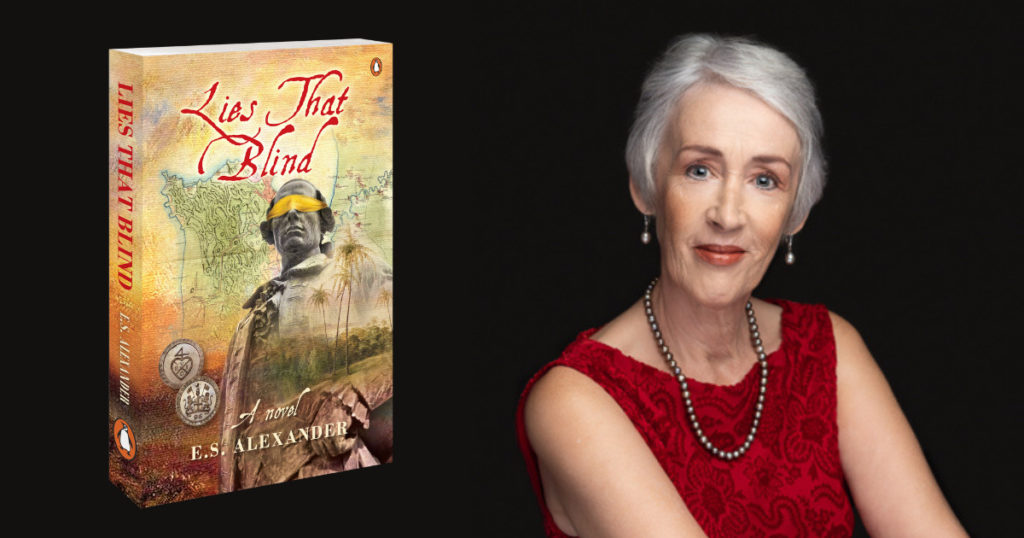October is National Book Month, a month-long celebration that focuses on the importance of reading, writing, and literature. In honor of this important month, it is fitting to invite E.S. Alexander, my co-author for Access to Asia, to return and write another guest blog post. Here Dr. Liz shares insight into a book about to be released on October 19th – the latest success in her impressive literary career.
I never guessed when co-authoring Access to Asia with Sharon Schweitzer, that the cultural understanding I gained from her would be relevant when writing my historical novel, Lies That Blind, some seven years later. After all, what possible connection could there be between those two, very different, books?
Lies That Blind came about quite serendipitously after I had relocated from Austin, Texas to the Malaysian island of Penang. Shortly after arriving, a publisher friend told me about the “founding” of this island in 1786 by Captain Francis Light, an agent of the notorious East India Company (EIC). As a journalist and life-long lover of research, I couldn’t wait to delve into the available literature, including many of Light’s letters and other documents. From these I gleaned that Penang’s first superintendent had not been entirely truthful in telling its legal owner, the Sultan of Quedah, what he could expect in return for ceding Penang to the EIC. Since I was not aware that anyone had written a novel based on this story—one populated by cut-throat pirates, a demanding Malay sultan, and the duplicitous Light, among others—I saw this as an opportunity to achieve a long-held writing goal, as well as to know more of the history of my new, chosen location.
My novel features both real-life historical characters and fictional ones, as well as some who lived on Penang island at that time but about whom we know very little. One character is the Malay headman known as Tuan Nakhoda Ismail. When protagonist, Jim Lloyd, meets Tuan Ismail he learns of the obligations that the Malay rakyat (“the people”) must accept when required by their chiefs and sultans.
For example, while conducting research for Lies That Blind, I discovered that the sultan expected to receive a duty for every plow used by farmers. The farmers were also obliged to cultivate the ruler’s land and populate his army without compensation. Chiefs could lay claim to a man’s property, including any desirable daughters he might have. These leaders would penalise those who wore nicer clothes or good shoes, since these were only meant for royalty. As Tuan Ismail goes on to tell Jim, “Ordinary people cannot lift themselves up or show originality in case they offend their rulers.”
Those of you familiar with Access to Asia will be aware that Malaysia has the highest Power-Distance (PD) ranking in the world, as identified by the Dutch social psychologist, Geert Hofstede. At the time of publication it was 104, now it is 100, so only a slight change in six years. Power distance refers to the extent to which members of a culture “expect and accept that power is distributed unequally.” There is a strong historical antecedent for this, since few people in Francis Light’s time—the late 18th century—dared to question their sultans and chiefs who would, among other abuses, arbitrarily set up unofficial customs houses to extract duties and taxes from unsuspecting traders.
Another way in which Malaysian culture is different to that of the United States concerns individualism: the U.S. scores highly with a 91 on the Hofstede Index, while Malaysia scores very low, with a 26. You only have to read the Hikayat Abdullah, written in 1845 by a Malacca-born munshi or teacher of languages named Abdullah bin Abdul Kadir—as I did as part of the research for my novel—to appreciate why many Malaysians, even today, find individualism such a challenge.
According to one Singaporean academic who used the Hikayat Abudllah to contrast how colonial and and indigenous rulers impacted their subjects’ lives: “The Malay kerajaan system (system of government) focused all power in the hands of a raja with a suitably grand and ornate court, which meant that if a raja misgoverned, then the people would inevitably suffer.” It is arguably difficult to show individualism while being ruled “under the kerajaan feudal system.”
If you read my novel, however, you will discover how one key character planned to defy such cultural expectations. Such is the benefit of writing fiction, even when it is linked to true events.
~ E.S. (Liz) Alexander is co-author of the award-winning, Kirkus Star Reviewed Access to Asia. She has written/co-authored 17 mainstream published non-fiction books since 1988. Lies that Blind, published by Penguin Random House SEA on 19th October, is her first novel. To read a brief synopsis please visit: https://penguin.sg/book/lies-that-blind/. Her biography can be found at: https://penguin.sg/book/lies-that-blind/
Other links:
Amazon book page: https://amzn.to/3mtkEJ3
Amazon author page: https://amzn.to/3Dov6IP
Goodreads: https://bit.ly/3BmK2GF
Facebook Page: https://bit.ly/3smDtA8
YouTube channel: https://www.youtube.com/channel/UCUSceIIWwVZtRuURu5n8f-A
Website/blog: https://www.esalexander.com
Instagram: https://www.instagram.com/liesthatblindnovel/
#historicalfiction #E.S.Alexander #LiesThatBlind #PenguinRandomHouseSEA #HofstedeIndex #PowerDistance #Individualism #Malaysia #Malaya #CaptainFrancisLight #history #culture #EastIndiaCompany #AccessToAsia


Leave A Comment